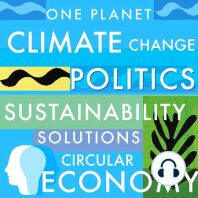20 min listen

Highlights - HENRY SHUE - Author of “The Pivotal Generation” - Snr. Research Fellow, Ctr. for International Studies, Oxford
Highlights - HENRY SHUE - Author of “The Pivotal Generation” - Snr. Research Fellow, Ctr. for International Studies, Oxford
ratings:
Length:
16 minutes
Released:
Apr 12, 2023
Format:
Podcast episode
Description
“These long-lived connections provide a radically different example of the insight from one of the characters created by my fellow Southerner William Faulkner: 'The past is never dead. It's not even past.'And similarly long chains reach from the present into the future. Conventionally, we tend to think that the future is yet to be born or is even only just beginning to be conceived. But the climate future was already beginning to take shape when humans started centuries ago to inject more carbon into the atmosphere than the usual climate dynamics could handle in the usual ways, and climate parameters were forced to start changing. The vast and accelerating carbon emissions of the late 20th century and the early 21st century are building minimum floors under the extent of climate change in future centuries, barring radically innovative corrections of kinds that may or may not be possible.[Timothy Mitchell has written:]'The modes of common life that have arisen largely within the last one hundred years, and whose intensity has accelerated only since 1945, are shaping the planet for the next one thousand years, and perhaps the next 50,000.' The future is not inaccessible – we hold its fundamental parameters in our hands, and we are shaping them now. In this respect, the future is not unborn–it's not even future.”– The Pivotal Generation: Why We Have a Moral Responsibility to Slow Climate Change Right NowHenry Shue is Professor Emeritus of Politics and International Relations at University of Oxford’s Merton College. He's the author of Basic Rights, as well as The Pivotal Generation: Why We Have a Moral Responsibility to Slow Climate Change Right Now, among many other publications. In 1976, he co-founded the Institute for Philosophy and Public Policy at the University of Maryland. He was a supporter of the successful campaign by Virginia's Augusta County Alliance to stop the Atlantic Coast Pipeline, and now works primarily on explanations for the urgency of far more ambitious policies to eliminate fossil fuels in order to avoid irreversible damage for future generations.www.merton.ox.ac.uk/people/professor-henry-shue https://press.princeton.edu/books/paperback/9780691202280/basic-rights https://press.princeton.edu/books/hardcover/9780691226248/the-pivotal-generationwww.creativeprocess.info www.oneplanetpodcast.orgIG www.instagram.com/creativeprocesspodcast
Released:
Apr 12, 2023
Format:
Podcast episode
Titles in the series (100)
(Highlights) ALICE SCHMIDT: Interviewed by Mia Funk · Associate Podcast Producer Marley Hinschberger by Sustainability, Climate Change, Renewable Energy, Politics, Activism, Biodiversity, Carbon Footprint, Wildlife, Regenerative Agriculture, Circular Economy, Extinction, Net-Zero · One Planet Podcast